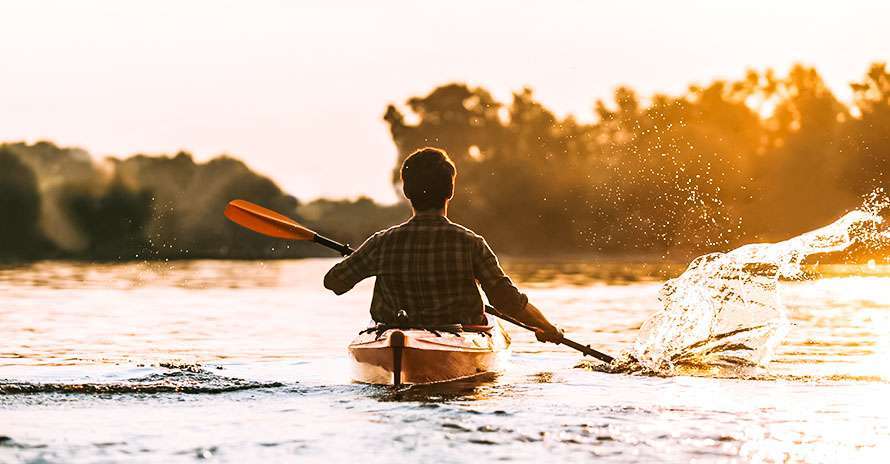After only a year or two of paddling, you start closely watching the snowpack, rainfall, and temperatures, and gradually become aware of a river’s moods. At first this knowledge is purely in terms of your favorite spots—you know you can surf a particular wave when the water gets to a certain level, or a certain rapid fills in and some great move develops. Over time, it expands into hundreds of such details, and they branch out into the tributaries and sister rivers of a watershed. Knowing each river’s quirks and gestures makes them feel like old friends. Your kayaking becomes a way to understand the river’s personality and how it focuses the forces of the surrounding land.
Personality Matters a Lot
Turned around, the personalities of your favorite rivers can be used as a mirror. A great Greek philosopher once counseled, “Know thyself.” Rivers provide an infinite number of ways to do that.
What you seek in kayaking reflects who you are. You may love freestyle moves or surfing, steep creeking or cruising. Class III may be your limit, or you may want to matriculate on the hardest things around and still reach for more. For at least 15 years, a group of my old friends loved taking a four- or five-day wilderness trip down the Middle Fork of the Salmon, laughing, ribbing each other, and sitting around a campfire as the stars shone overhead.
What You Get from Kayaking
When I ask people what they get from kayaking, they mention the traveling, friendships, and beautiful places. Young men usually say it’s a blast, awesome, and challenging. Young women often stress that they’ve found confidence, overcome fear, and become physically strong.
My kayaking has run the gamut of playing, first descents, competition, expeditions, and solos and has coincided with my roles as a professional scientific editor, husband and father of five, and large-business operator. Because I’ve had to balance those different worlds, I’m a strong believer in regularly examining our lives. Knowing yourself, your weaknesses and strengths, is the first step toward some kind of wisdom in an ongoing search for ideals.
Kayaking Does Have Some Obvious Dangers
It’s both a simple fact and a profound truth that the fun of whitewater comes in part from the potential danger. If there were no consequences to your actions and you didn’t have to worry about getting thrashed or worse, then it wouldn’t mean as much to you. Things can get ugly in Class III; you don’t need to be in Class V to have a really bad experience. So, the first question I ask about knowing yourself is, where does the danger fit into your life?
The nature of moving water and rivers underscores every decision you make, and nowhere else can you see so clearly how one choice sweeps into another. An early lesson the river teaches is that you have to be engaged at every moment. Even a small lapse can snowball into a huge problem. That’s where the excitement comes from—the interplay between your skills and the river’s complexity, and power creates your anxiety and, sometimes, fear. This is why you get satisfaction from making a hard move or line, just right, in a challenging rapid. Of course, danger has other nastier sides, and the key is finding the balance.
Is your fun enough to die for
For people who paddle difficult whitewater, a second related question I ask is, what are the things you get from the sport that balance the danger? Let me point-blank it: Is your fun enough to die for? I think not, but some people act as if it is. Realistically, the more time we spend on something, and especially the more potential danger it carries, the better our reasons should be for doing it.
Choice of River for Kayaking
As fantastic and as exciting as paddling is, consider your river choices not only as a paddler, but as a person. As a father or son, as a mother, daughter, or friend. Part of my own answer to the philosopher’s counsel is to look for the things that push my understanding. Not just physical skills and knowledge about rivers, but the effects on my judgment and things that I can share with the people I love. When I talk with younger people about the experiences they valued the most, they mention character-building, like overnight trips where things didn’t go right and they wound up spending the night sitting on a rock in the jungle. They talk about traveling together, tempers coming out, and learning to live with other people. All of these are good answers and strong steps in the direction of self-knowledge.
Class V Kayaking And Living The Dream
But again, these days, some talented teenagers progress so quickly that they run potentially life-threatening Class V and huck 80-foot waterfalls. The bigger the consequences, the better the reasons should be. A cliché like “he died doing what he loved” is a weak answer for parents who spent 20 years nurturing their son’s growth, or for his friends who are left with a void in their lives. For young, talented people who are getting sponsorship and “living the dream,” it probably is much harder even to see any value in the questions I propose. It’s much easier to be wrapped up in youthful enthusiasm and the outer rewards of their skills. Yet, the questions remain, and once the cheering and sponsorship stop, those questions will force themselves into the forefront—where they probably should have been all along.
Kayaking Takes the Strain Away
One good answer many people have, without really thinking about it, is that they take the enthusiasm they have for the river and apply it to the other things they do. The river charges them up, eases their frustrations, and makes them into better people. That infectious good will and passion are worth their weight in gold. Who would you rather be with, somebody who’s uninspired about life, or a person brimming with good spirits?
Kayaking Leads to Self-awakening
Another answer that is harder to apply, because it requires deliberate attention, is mindfulness. You can’t paddle something even halfway difficult and not be forced to pay close attention to the subtleties of the features and current. A single experience of being completely focused on the moment will remain with you, vividly and convincingly, for your whole life. If you add a little objective danger with real consequences to this, it becomes a compelling, potent brew. The simple reaction is to want more of it, to hunger for it with the same intensity you have in a passionate love affair. However, it is important to take this another step further. That is, to see your mindfulness on the river as an inspiration for what you can do when fully engaged. It is an awakening; it gives you a glimpse of the kind of person you could be. So as an ideal, take the same care that you have in running rapids at your limit, and apply it to everything you can off the river.
Consequences In Normal Life
Think about a few of the consequences in normal life. They usually aren’t as direct as getting hammered in a rapid, but that doesn’t make them any less important. Consider, for instance, being mindful about fairness and having respect for others. If you impulsively insult somebody, flip them the bird in traffic, cavalierly treat a person like he or she doesn’t exist, think of those things in terms of a kayaking decision in hard Class V. They all have consequences, even though you might not see them because they are inside the other person. They are there, and just as surely, they remain inside you as well, reflecting who you are. Ask yourself this question from time to time about the mindfulness you love so much when paddling: Is our goal really to be mindful on the river and mindless off it?
It is All About Perspective
A final issue is perspective. As intense and meaningful as paddling may be at times, no matter how important kayaking is to you, and no matter how far you push your skills, the hardest things you’ll ever do won’t be on the river. I’ve pushed myself very, very hard in kayaking: first descents and expeditions, top-end solo runs, 8,500 vertical feet of Class V in a day, rapids few would touch, numerous severe injuries and thrashings.
But the hardest things I’ve ever done weren’t on the water. They were being a parent, having a job and raising five children, being a good husband, and taking care of my father when he was dying. They were dealing with the suicide of my best friend and of my younger brother, who left his own five young children with a hole in their lives that I could never fill. Those are the hardest things I’ve ever done.
I love kayaking because it’s the most joyful, challenging, wildest sport I’ve ever done. However, looking back on the last 25 years, I value it most for how it fits into my life and what it means. Paddling can be a great sport and recreation, but it can also deepen the best qualities you have as a person. Know thyself, a great philosopher once said. The river is that philosopher’s equal, and more, if we only listen.

